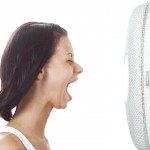Could it Be “The Change”?
 Recently I went to dinner with some girlfriends and inevitably discussion of our bodies came up. Our bodies, our temples, seem too often to be houses of betrayal. With all we go through in our lives we spend a good portion proclaiming, “what the hell?” In this particular conversation we started comparing changes we’ve noticed and questioned whether these could be precursors of “The Change”?
Recently I went to dinner with some girlfriends and inevitably discussion of our bodies came up. Our bodies, our temples, seem too often to be houses of betrayal. With all we go through in our lives we spend a good portion proclaiming, “what the hell?” In this particular conversation we started comparing changes we’ve noticed and questioned whether these could be precursors of “The Change”?
It seems once females hit puberty, the fun is just beginning – then we have pregnancy, labor and delivery and of course, that big enigma, post partum. But it seems before we recover from those, perimenopause starts rearing her cranky head. According to the Mayo Clinic, “Perimenopause means “around menopause” and refers to the time period during which a woman’s body makes its natural transition toward permanent infertility (menopause).” — Oh god! They make it sound so lovely, but is it really?
So there really is no break. Menopause is no longer a whispered “condition” we epitomize with grandmas -symptoms usually show up in our 40s, but can begin in our 30’s or (gasp) earlier. Perimenopause is the official time BEFORE true menopause hits (Menopause being complete cessation of egg production). But before that time, hormone levels can be changing and symptoms can insidiously start making their presence known. Perimenopause officially begins at the time the ovaries start decreasing estrogen (and also egg) production. The closer to menopause we get, the less estrogen (and eggs) produced and the greater the menopausal symptoms. This can last about 4 years but may be as short as a few months to more than 10 years.
Signs
Hot flashes
Breast tenderness
Decreased libido
Fatigue
Irregular periods and urinary problems
Mood swings
Sleep problems
Decreased bone density
Increase bad cholesterol (LDL) with a concurrent decrease in the good cholesterol (HDL)
But wait! Before you slip into your house dress, specs and settle in with some knitting, there is hope. If you are starting to notice some of these subtle changes, talk candidly to your doctor. A simple blood test can determine your hormone levels and there are treatments available for the uncomfortable and sometimes embarrassing symptoms. It may also be helpful to have a candid chat about this with your spouse and maybe even your older kids so they can be supportive rather than cower in fear. Lastly, nothing beats taking charge of what you DO have control of – you can cope with these changes much better by maintaining a good balanced diet, exercising and getting enough sleep. And don’t forget those supportive friends – always a must to help you through any kind of change.




















